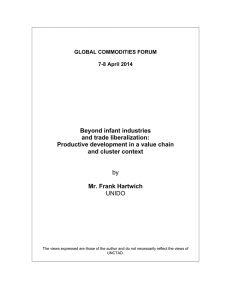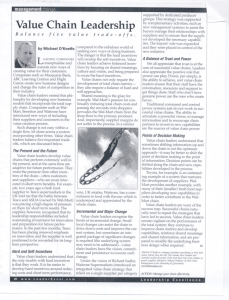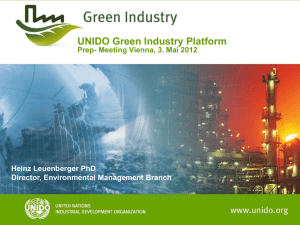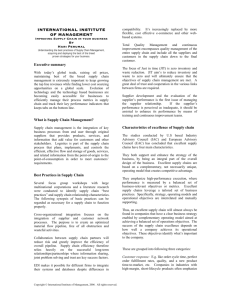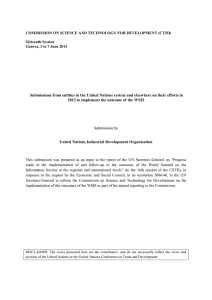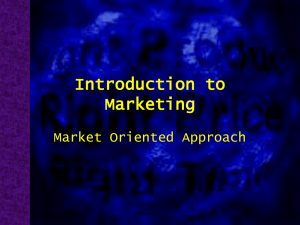Linking to the buyers: UNIDO work on development
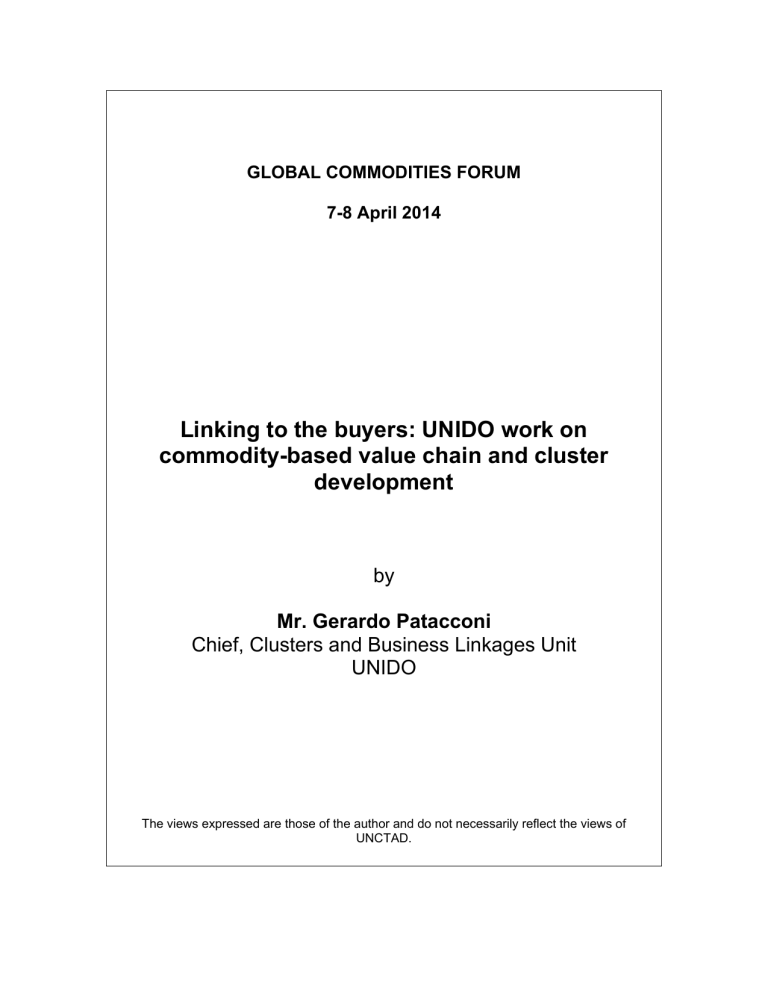
GLOBAL COMMODITIES FORUM
7-8 April 2014
Linking to the buyers: UNIDO work on commodity-based value chain and cluster development by
Mr. Gerardo Patacconi
Chief, Clusters and Business Linkages Unit
UNIDO
The views expressed are those of the author and do not necessarily reflect the views of
UNCTAD.
Linking to the buyers:
UNIDO work on commodity-based value chain and cluster development
UNCTAD annual Global Commodities Forum
“Global Value Chains, Transparency and Commodity-based Development”
7-8 April 2014 Palais de Nations, Geneva
Gerardo Patacconi
Chief, Clusters and Business Linkages Unit
Business, Investment & Technology Services
Branch
UNIDO
• The issues
• UNIDO’s PPP Sustainable supplier development programme
• Successful commodity-based value chains projects
• Conclusions
commodity
‐
based
value
chain
and
cluster
development:
The
Issues
Commodity-based Value Chains in
Development
• Business Objectives
– Market Access and Profitability
– Linking to Buyers (manufacturers or retailers)
• Development objective
– improving income, jobs and food security
– Diversification
– Value addition and integration
– Consumer protection
– Climate Change…
• Inclusive
• Sustainable
• Pro-Poor
• Ethical
• Genderbalanced
Commodity-based Value Chains in
Development
Value chains are becoming shorter with higher standards and stronger, vertical integration and information flows.
Concerted effort by governments,
NGOs, civil society, the private sector and the donor community to create an enabling environment for their development.
Focus on holistic VC analysis and development
• Most value chain development approaches have specific purpose
(e.g., market access, inclusion of the poor, enterprise development, or compliance with standards) - not holistic in nature;
• No sufficient analysis and understanding of systemic challenges
• UNIDO targets 7 dimensions for diagnostics: i) inputs and supplies, ii) production capacity and technology, iii) markets and trade, iv) value chain governance, v) value chain finance, vi) cleaner production and energy, vii) business environment and policies.
• Goals:
– poverty reduction,
– income and employment creation,
– economic growth,
– firm development,
– cleaner production and environmental sustainability…
Holistic value chain & Cluster mapping
Generic examples of clustering across segments in the value chain
Source: The authors
Source: The authors
8
Global value chain dynamics and and the role of clusters
Source: The authors
9
Approach
Quantity matters: Focus on cluster development
– Work with existing clusters and foster new aggregations of suppliers
– Private-sector-oriented
– Pro-poor growth,
– Collective efficiency through joint actions
Measures
1) Foster linkages between cluster stakeholders,
2) facilitate consensus building,
3) build relationships,
4) encourage trust building,
5) strengthen governance mechanism
6) support the cluster’s institutional network and
7) strengthen cluster governance mechanisms
Focus on export consortia
• In case of lacking export capacity
• Exporting is a complex business involving high risks
• Voluntary alliance of firms with the objective of promoting export of goods and services
• Export via cooperation
• Joint activities such as management training, ISO certification, factory organization, etc.
• Empowerment of weaker economic partners and linking them with dynamic firms. Measures:
– support to consortia creation,
– training of promoters of export consortia in the public or private sectors,
– promoting a favorable institutional and regulatory environment for the development of export consortia;
– benchmarking of international good/best practice
Focus on firm networking for local capacity development
• Networks are alliances of firms that work together towards an economic goal
• Can exist outside clusters
• Horizontal and vertical networks
• Approach:
– Building institutional capacities to foster network development
– Trust building
– Engaging knowledge network brokers.
– Fostering learning through collaboration
– Stimulation of ideas, skills and competencies development
Focus on standards compliance infrastructure development
• Need to develop systems to comply with the new management standards,
• Countries are required to operate laboratories , which are able to test products and samples for compliance to international standards.
• UNIDO’s assistance consists particularly in:
– Enabling national standards bodies to offer services for industrial compliance with WTO agreements, while taking into account private sector, exporter and consumer needs;
– Developing local capacities in metrology, calibration and product testing, in order to provide services to local testers, producers and exporters according to international best practices, and also to enhance consumer protection;
– Enabling national and regional accreditation schemes to assess the performance of local and regional laboratories, inspection units and certification bodies; and
– Building the capacities of consumer associations to promote consumer rights based on national policies and in line with international best practices.
Focus on business agglomeration within industrial parks
• Insufficient infrastructure and services in developing countries
• Industrial parks provide business-enabling conditions and infrastructure
• Concentration of industries and support services attracts investors
• Industrial parks can become growth and innovation hubs
• UNIDO supports the development of industrial parks:
– identifying appropriate locations,
– planning of scope and scale of park operations,
– marketing and promotion of the park concept, promotion of investments,
– setting up service providers that are able to provide infrastructure,
– setting up capacity to manage park development and park operation,
– linking up firms in the park via cluster and networking approaches,
– provision of manufacturing and agro-processing knowledge and technology and support to marketing efforts of firms
Focus on regional/supranational integrated value chain development
• Why going global and depending on lead buyers and suppliers?
• Option to develop regional value chains
• Near-shoring and regional products
• Regionalization of value chains makes sense if conditions in the international supplies and markets allow for it.
• South-south collaboration
Focus on supplier development
• Work with farms and firms in developing countries – organized in clusters - that face difficulties complying with market requirements and lack technical and financial means to produce goods with appropriate quality at required quantity
– Gradual capacity building among suppliers in developing countries with a continuous improvement focus at heart:
– Develop partnerships for responsible supply chain development and promote appropriate and feasible cost sharing among different partners:
– Adapt to country or region :
– Engage in harmonization of standards
– Promote networking among firms
– Stronger bargaining power
UNIDO’s Sustainable Supplier Development Programme
Within the categories of UNIDO ‐ Private Sector partnerships
CORE BUSINESS
OPERATIONS
& VALUE CHAINS
SOCIAL INVESTMENTS
& PHILANTHROPY
1. Developing adapting
or products for rural/low income populations
2. Localizing the business value chain by using local suppliers and service providers or creating local distribution networks
1. Investing within the value chain through strategic financial and in ‐ kind investments within the company’s supply chain and/or broader operating context
2. Applying technology to enhance reach and access for current and new programs with social goals
ADVOCACY & PUBLIC
POLICY ENGAGEMENT
1. Addressing business and development agendas to ensure commercial viability with social impact goals
2. Pushing for mandatory standards and formal regulations rather than only creating voluntary industry standards
3. Integrating practices that protect and preserve the environment by improving resource management
•
Sustainable development concerns integrated progress on economic development, social advancement and environmental protection
•
Triple Bottom Line – organizations assume responsibility for all their impacts, including social, environmental and economic
UNIDO Sustainable Supplier Development Programme
• Rationale : new form of Public-Private
Partnership, which integrates Quality,
Safety and CSR objectives with business objectives and operates as an inclusive and pro-poor development scheme
• Objective : enable clusters of suppliers in developing countries to:
– gain access to profitable new market opportunities
– establish long-lasting business linkages with buyers
– generate new jobs and income opportunities
– increase availability of sustainable and safe products
IMPROVING SUPPLY CHAINS: Impact for Emerging economies
Challenges:
• Continuous compliance with standards and market requirements;
• Reliability is a key success factor in supply chain management;
‐ Price pressure and cost reductions
‐ Limited bargaining power unless strong networking/clustering
• Fast disappearance of small and informal retail outlets : reduction of business opportunities for smaller producers
• Innovation : design products and supply ‐ chain strategies;
• Strong demand for capacity building and the need to invest in it.
Benefits :
• Buyers will further increase global and local sourcing ;
• Increase private labels/own brands
• Buyers will intensify their efforts in building long ‐ term partnerships with suppliers and expand suppliers’ base;
• Buyers may pay a higher price than competition
(=efficiency premium) (?)
• Buyers invest in distribution and storage infrastructure in emerging economies;
• Buyers address also CSR (social, economic and environmental)
• Export opportunities through the global buyers
• Value creation for customers ;
• Positive impact on products sold on the local market (quality, quantity, safety, sustainability)
Sustainable
Supplier
Development
Programme
EXPECTED IMPACT
• Pro ‐ poor and inclusive PPP development scheme
•Supplies gain access to profitable new market opportunities and are accepted as reliable suppliers to establish long ‐ lasting business linkages with potential buyers .
•Better buyers/supplier relation (price, bargaining power..)
•Retailer up in the Dow Jones Sustainability in dex…..
BENEFITS FOR DEVELOPING COUNTRIES
• Increase both job and income opportunities for developing countries’ suppliers
• Increase availability of safe products to achieve higher consumers’ protection .
• Image improved as supplier of higher quality, safe and sustainable products
•Able to profitably respond to consumers and buyers demand for ethical, social and environmental sustainability (through adaptation of UNIDO REAP) and quality and safety requirements
Where it all started: UNIDO ‐ METRO SSD ‐ based partnership
The cooperation between UNIDO and METRO started in 2009 and focused on joint technical assistance, awareness and competency ‐ building programmes on supplier upgrading and compliance.
It responds to the need of farms and SMEs in developing countries and economies in transition to access profitable new market opportunities by being accepted as reliable suppliers and establishing long ‐ lasting business linkages with potential buyers such as the
METRO Group.
UNIDO and METRO renewed and expanded the scope of the historical agreement
UNIDO ‐ METRO joint activities have been guided by an “ inclusiveness ” principle to integrate “ less ‐ developed businesses ” into “formal” trade , which in turn can positively impact the livelihood of producers, workers and their families and increase the availability of safer, higher quality and more affordable products for consumers and create new job opportunities.
The programme is to be expanded to other retailers and to be implemented in the areas of agribusiness and technology, quality and conformity, supplier development and sustainability;
DÜSSELDORF, 2 September 2011
Partnership Example: UNIDO – METRO Group
• PARTNERSHIP CATEGORY: Core Business Operations & Value
Chains
• INDUSTRY: Retail
• PARTNERSHIP OBJECTIVE: Enable suppliers to gain access to new market opportunities, making supply lines more efficient, inclusive and sustainable
• GEOGRAPHIC SCOPE : Pilot projects in Egypt, India, Russia
• RESULTS & OUTLOOK :
9 Cost-sharing business model developed and implemented
9 Improvement in compliance with basic food safety standards and individual performances among participating 90 SMEs and
800 farms
9 Basis to develop a global Sustainable Supplier Development
Programme (SSDP)
24
9 34 supply contracts have been signed
Egypt
Summary
India Russia
Implementing
Party
Scope
National
Institution
(non-profit)
Basic and
Intermediate
Metro Staff
Basic
Number of
Suppliers
18 Basic
25 Intermed.
10
Duration of
Basic
3 Months 5 Months
Ups-scaling 90 Suppliers Ongoing
Discussions
Individual
Consultants
Basic
22
8 Months
Ongoing
Discussions
Partnership Example: UNIDO-AEON Group
• PARTNERSHIP CATEGORY: Core Business Operations & Value
Chains
• INDUSTRY: Retail
• PARTNERSHIP OBJECTIVE : Facilitating suppliers’ access to new markets; Increasing safety and sustainability of products
• GEOGRAPHIC SCOPE : Malaysia
• RESULTS:
9 Strengthened compliance with food safety standards and sustainability requirements.
9 Companies upgraded: 25
9 Companies with higher productivity rates: 15
9 Companies improving productivity and sustainability: 5
• OUTLOOK:
9 Planned roll-out to reach 100 food processors, also covering primary production
9 Malaysia to become a regional hub for sustainable supplier development
26
New Partnerships in Value Chains
– Walmart and Pick ‘n Pay in SSDP programme in Africa
– Migros (Switzerland)
– Illy Café (Coffee in Ethiopia)
– Agrana (Strawberries in Middle East)
– Chiquita (Bananas Sustainability in Central America)
– Coop Italia ( Green Beans in Burkina Faso)
– Drefyus Commodities …….
New Partnerships in Value Chains
28
New Partnerships in Value Chains
29
New Partnerships in Value Chains
SMALL FARMS.
BIG BUSINESS
30
HOW TO MAKE COLLABORATION WORK
• GOVERNMENTS : To contribute and be part of it; no conflict between regulations and GFSI nor GSCP
• BUYERS : To integrate functions (QA, Purchasing, CSR, and to work as a buying cluster)
• SUPPLIERS (commit to continuous improvement, collective actions..)
• DONORS and DEVELOPMENT PARTNERS (no duplication and joint funding)
• GFSI/GSCP : foster integration of tools and competency/capacity building, KPIs. Monitoring and
Evaluation…
• SERVICE PROVIDERS : take part of the scaling up/expansion
Conclusions
• Embracing versus encountering global buyer dominance
• Strengthening skills and the technology used use in existing production processes
• Developing innovate capacities to venture into new activities downstream in the value chain and in other sectors
• Drawing from in-depth value chain analysis and corresponding industry strategy development based on holistic understanding of the value chain
• Mix of instruments in line with the structure of the chains
• Economic, Social and Environmental Sustainability
THANK YOU FOR
YOUR ATTENTION!
Contact details:
G.
Patacconi: g.patacconi@unido.org
